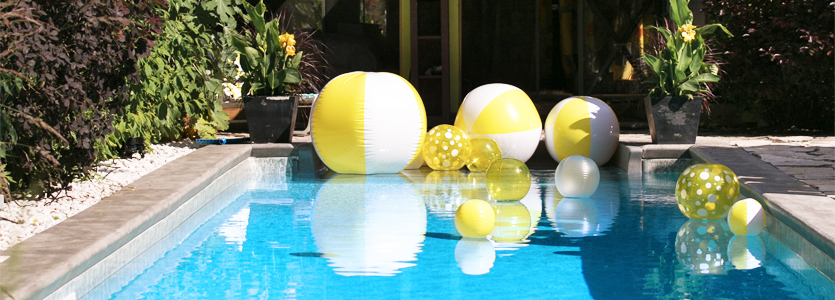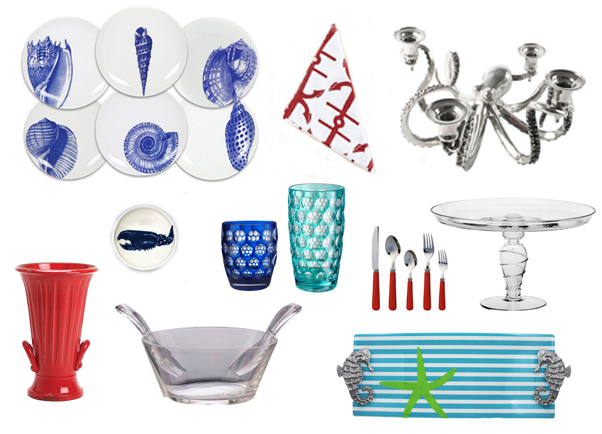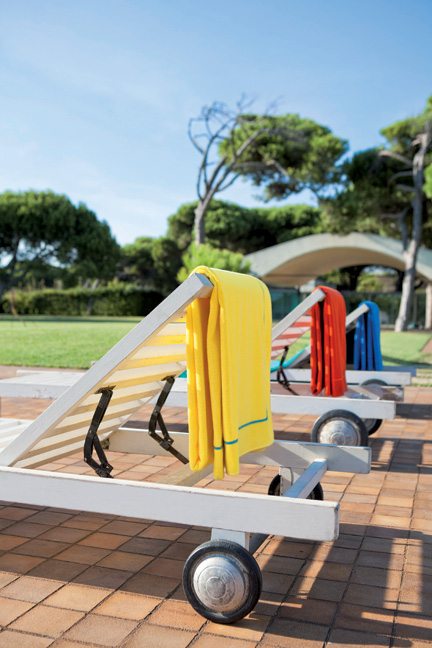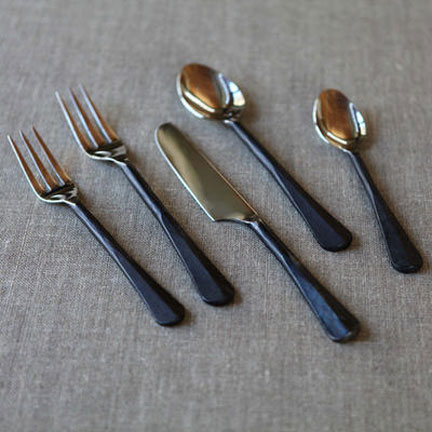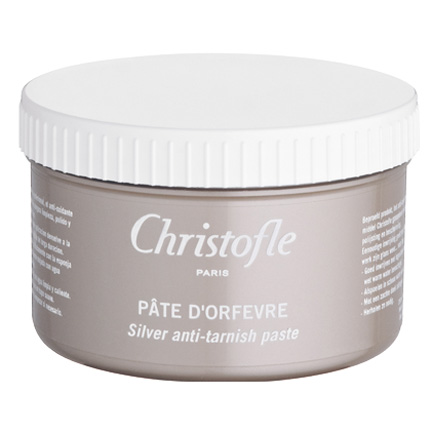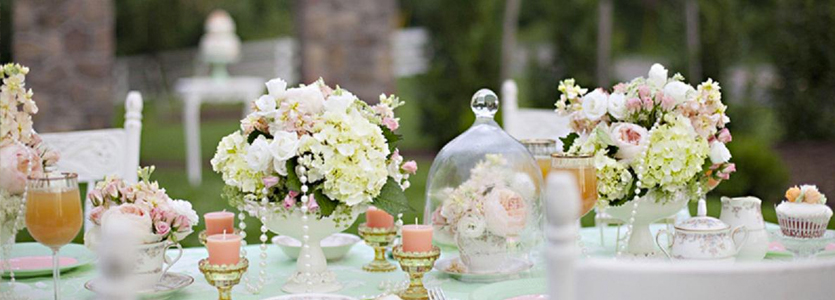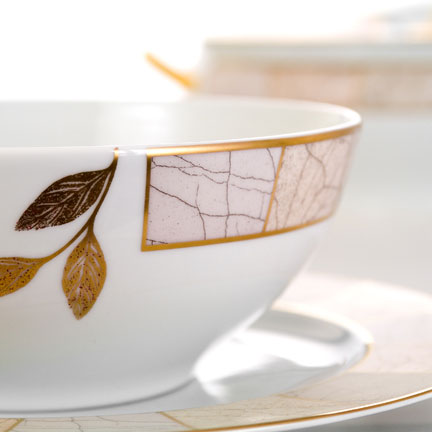Save to...
The Best Specialty Finishing Salts
We have a kitchen shelf full of condiments, but the one I reach for most often is salt. Now, if you’re ready to move beyond regular table salt for baking and kosher salt for cooking, here are the best finishing salts you need to own. And remember, since they’re only used on finished food, a little goes a long way.
Maldon Flake Salt – loved by chefs around the world, Maldon flakes have a clean, fresh taste with no bitter flavors. Amazing on cooked eggs and sprinkled on brownie batter, it brings an explosion of flavor to the mouth.

Fleur de Sel de Guerande – hand-harvested from pristine salt marshes in Brittany, France, this salt is unprocessed, so it’s moist and retains a complex flavor of the sea. Use it on leafy green salads, grilled fish, fruit, and caramel sauce.

Himalayan Pink Salt – hand-mined salt found deep within the Himalayan mountains, these beautiful salts are best appreciated on lighter-colored foods like fish or chicken.
Truffle salt – sprinkled on fresh pasta with butter, roasted potatoes, and buttered popcorn, this packs a fragrant punch. The truffle aroma is super addictive.

Salts this beautiful should be served in the right container. For casual meals I love this olivewood container from Williams-Sonoma …

… but for evening there’s nothing more stunning than silver next to candlelight:
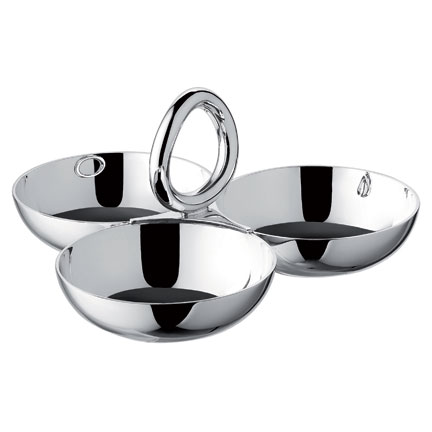
Looking for one? Click here to view all our condiment servers and butter dishes, and here to view more salt & pepper shakers.
Le Bresil Dinnerware: A Collaboration with Zuber Wallpapers
Created in collaboration with Zuber & Cie, Haviland’s Le Bresil Dinnerware is as much a work of art as Zuber’s famous Les Vues du Bresil scenic mural wallpaper collection. Originally introduced in 1829 and printed in 247 colors from 1693 blocks, Bresil is one of Zuber’s most complex productions.

Each Zuber panel contains large expanses of color and incredibly ornate details, many of which are recreated in the dinnerware.

With tropical trees and exotic birds, the elaborate imagery of the dessert plate captures the imaginative spirit of Zuber’s colorful scenes.

By balancing the delicacy of the bird in the foreground with the intricacy of the trees behind, Haviland’s artisans used dimension to perfect Zuber’s meticulous style in this stunning tray.

If you love this as much as we do, next time you’re in Switzerland, be sure to stop by the Musee du Papier Peint, which has a mural of the wallpaper in their Salon Bresilien:

Salon Bresilien in the Musee du Papier Peint (courtesy museum)
For more pieces from this exquisite collection, click here.
10 Tips for Hosting Fun Parties
It never rains in L.A. in August … except a couple of Sundays ago. Which could have been a disaster, since we had planned a post-wedding garden brunch for 45 relatives. At the last minute, we cleared the living and dining rooms to set up the party indoors, and the party turned out to be a big hit. The smaller, more intimate space got people closer, the guests talked a lot more with each other, and everybody had a great time. What could’ve been a two hour brunch lasted five hours until the final guest ambled out.
We spent the next few days thinking and talking about our guests and the party, what we learned and what we’d do differently, and here are some tips and lessons from our experience:
Put the Early Guests to Work
Somebody always shows up early. Relax — they’re usually your best friends (or at least think they are), so put them to work setting out food and drinks or finishing up the decorations. They’ll feel useful, and you’ll get some help.
Smaller Spaces Make It More Fun
Putting people a little closer makes it easier to talk, so use smaller tables and put some food in the kitchen to encourage mingling. If someone can’t chat easily with the person across the table, then the table is too large.
Make the Food Easy
The food has to be easy to serve, easy to keep, and easy to understand. Everybody got the grilled vegetables and seafood paella, but the chilled peanut noodles (our personal favorite) was left behind. The leafy salads also got soggy by the end of the party, so we’ll have to rethink that one for next time. Avoid foods that require pan searing, deep frying, or chilling — they won’t look or taste so good after a while.
Have Different Food and Drink Stations
Keep people moving around with food and drinks in different places. It’ll give everyone more chance to walk around, graze, and mingle with each other.
Plan for a Longer Party
A good party keeps itself going, so think about how everything would look if the party went on for longer. Plan for more drinkware (people ended up using on average two glasses each, even after marking their glasses.) Have more forks than the other flatware pieces available. Use paper lanterns instead of balloons. They can be set up a few days before and will last through the whole day.

Spontaneity Instead of Speeches
Ever sat through a speech or slideshow wondering when it’ll end? It’s better when people are just having a good time chatting with each other. Try to move your guests around if the conversation starts to flag.
Get Some Games Started
Checkers, chess, Scrabble, Monopoly, Pictionary. Set them out, then start a game with a few guests. If they’re in the mood for fun, they’ll pick up all on their own. Unusual games (Chinese chess in our case) are especially good conversation starters.
Serve Some Sinful Desserts
When people are having fun, they break their diets, so make sure you have a few desserts they wouldn’t normally eat. The tres leches cake, which we thought few people would touch, was gone before halftime. Our guests then went on to polish off a full box of macaroons and half a box of tea cakes. The fruit salad, on the other hand, was still plentiful at the end.

Have Lots of Trash Bins
Not glamorous but very useful. Set one near every table.
Old Habits Die Hard
Since it was a brunch in the middle of summer, we’d only planned to serve cold drinks. But old habits die hard, and guests asked for tea to go with their Chinese food. Luckily, this was super fast to fix, but next time we’ll be sure to have both tea and coffee ready to go.
Do you have any party planning tips of your own? We’d love to hear them!
For Opera Lovers: Dinnerware Inspired by Mozart’s The Magic Flute
Written in the late 18th Century, Mozart’s Die Zauberflöte, or The Magic Flute, is one of the best-loved operas in history. With this as his inspiration, whimsical Danish artist Bjørn Wiinblad created the Sarastro dinnerware collection for Rosenthal.
Each piece in the line features a different scene from the opera depicted in relief, so they all sport exceptionally wide rims.
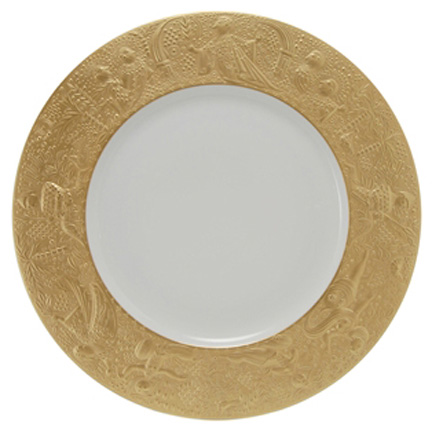 |
 |
 |

The genius is in the details. Here are a few of the ones we’ve discovered:
Fowl Play: The symbol of the bird is used throughout this opera. For example, one of the central characters, Papageno the bird catcher, sings playful tunes intended to mimic the sound of chirping birds. Look closely at pieces from Wiinblad’s dinnerware collection, and you’ll see that the theme of the bird is shown in beautiful relief throughout.

Up to No Good: With elaborate costumes and heavenly melodies, Mozart created many of his characters to be deceptively beautiful. The Queen, who initially appears to be harmless, later reveals her malicious intent to destroy Sarastro. In Wiinblad’s depictions of these characters, they are intentionally shown in an aura of ambiguous elegance.

Hidden Secrets: There are beautiful secrets and surprises hidden throughout the opera. For his part, Wiinblad surprises his audience by using his own handwriting to paint the names of the arias and scenes depicted on each piece. But they’re not obvious … he’s hidden them in the crevices and underneath each piece.
 |
It is a collection that looks as good on the table as it does on the shelf. Available in gold or plain white, each piece is delightful.

To view all pieces from this extraordinary collection, click here.
Kim Seybert Holiday Collections – Get Them Before They’re Gone!
Every year, there’s a mad rush for Kim Seybert’s holiday collections, and she always runs out. So this year we wisened up and asked for a sneak preview in July. Take a look at what’s new, and get it now before it’s gone. Happy early holidays!



In the spirit? Click to view all our Holiday 2014 collections here!
Party Ideas: Pool Party
Welcome to the first installment of our series on party ideas. We’re starting with a classic summer essential: The Pool Party! With durable acrylic glassware from Mario Luca Giusti and a fabulous Octopus candle centerpiece from Vagabond House, you’ll feel be be making a splash in no time flat.
Pool Party Essentials
And let’s not forget the most important pool party accessory: the beach towel. Doesn’t this make you want to call your friends, pour a margarita and slather on some sunblock?
Hope you found some inspiration from our curated items. Feel free to mix and match new items with your currently existing collection. As long as you’re bringing fun into the mix- your party will be a success!
Not throwing a pool party? Check out our other Party Ideas here!
Guide to Choosing Flatware
There are so many exciting choices in flatware, you are probably asking yourself, “Where do I start? Which material should I select, and how many pieces will I need?” We break down the basics for you, so your table will look fabulous in no time flat.
Understanding Flatware Materials
What are the different types of materials used to make dinnerware?
Sterling: Sterling silver flatware collections are true heirlooms. Sterling is made of at least 92.5% pure silver and an alloy (usually copper for added strength). Any piece of flatware that meets these guidelines is stamped with the word “sterling” to ensure its authenticity. Sterling silver is very expensive, but it makes the most elegant and formal flatware. Compared to stainless, sterling has a warmer glow and may require occasional polishing. When not in use for prolonged periods, we advise keeping sterling in felt pouches to prevent scratches or tarnish.
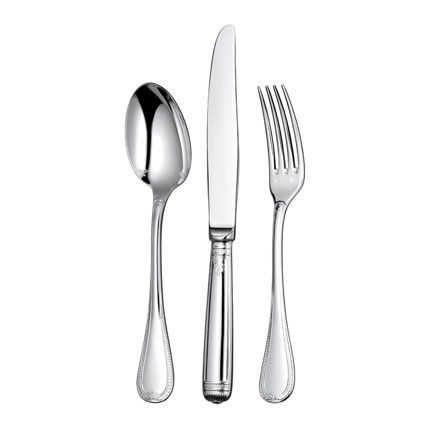
Silverplate: Silverplate is a dishwasher-safe, less-expensive alternative to sterling that can last nearly as long. A layer of 100% silver coats another metal, usually nickel or brass. Nickel is best, because it’s harder than brass and silver adheres to it well. The thicker the silver layer, the better the quality.
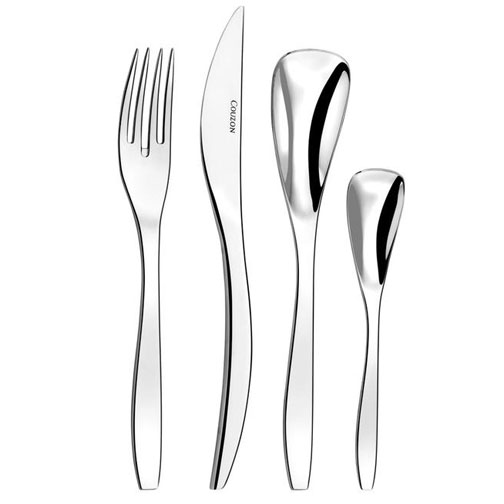
Stainless Steel: Most everyday flatware is stainless steel, which doesn’t rust, tarnish, chip, or wear out. Stainless steel is commonly defined as a metal alloy that contains a minimum of 10.5% chromium. To make stainless steel flatware, chromium is added to steel for strength as well as rust and stain resistance. Nickel, another metal alloy, is also added to the steel for its brilliance and lasting finish. The grades (18/10, 18/8, and 18/0) refer to the amount of nickel, which prevents corrosion. The best grade is 18/10, because it is the longest lasting.
Why is stainless steel “stainless”?
Compared to other metals, stainless steel is particularly resistant to rust and discoloration because the oxide film in the metal absorbs common forms of discoloration. Keep in mind, however, that while stainless steel certainly stains less, it is not completely stain proof.
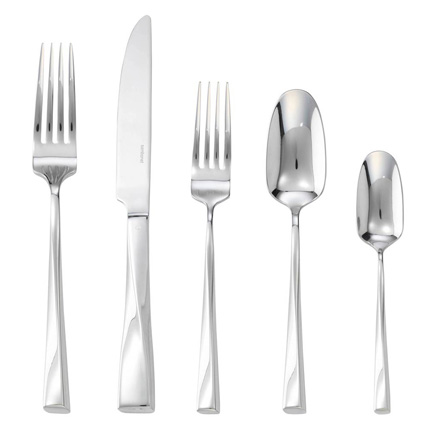
Pewter: In colonial America, pewter was prized for its strength and durability. Today, pewter products are sought after by collectors for their rustic feel and beautiful patina. Pewter does not require polishing.
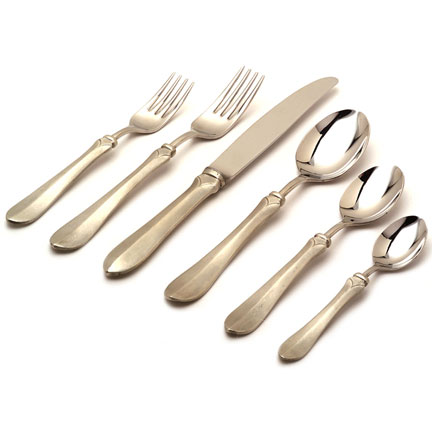
PVD: Is a thin ceramic coating deposited on stainless steel pieces, resulting in colored implements. It is very hard and resists abrasion well.
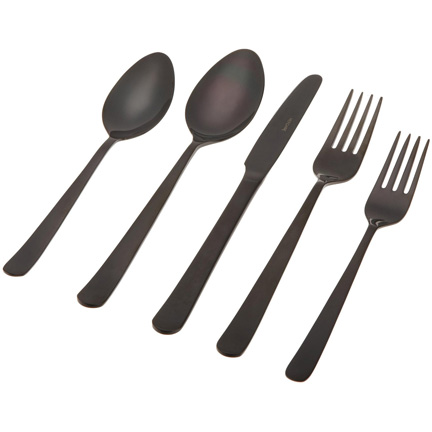
Acrylic: Acrylic flatware with colored and patterned handles is sold in a rainbow of styles. Fashionable enough for formal events, it’s also great for everyday use. Q Squared’s London Chic collection, and Vietri’s best-selling Aladdin collection, are perfect for adding personality to your table setting.
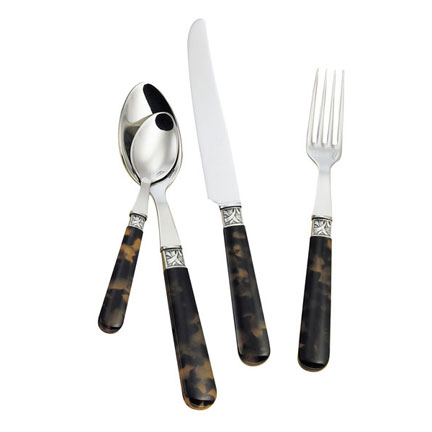
Suggested quantities
What is included in a five-piece setting?
Five-piece place settings consist of the following: dinner knife, dinner fork, salad fork, tablespoon and teaspoon.
Can I order additional flatware pieces?
Yes. In addition to five-piece settings, additional pieces such as butter spreaders, fish forks and knives, demitasse spoons, salad servers, cake servers and gravy ladles are standard items in many collections. Please write us at service@graciousstyle.com for further information on any of our collections.
How many flatware collections do I need?
Generally, most people have at least one casual collection for everyday use (usually stainless steel) and one formal collection for selected occasions (usually sterling or silverplated).
What serving pieces do I need?
– Twelve five-piece settings
– One serving set (serving knife and serving fork)
– One salad serving set
– One carving set
– One set of steak knives
– One cake server
Caring for Flatware
How do I care for stainless steel flatware?
Stainless steel flatware is dishwasher safe; it can also can be washed by hand.
How do I care for silverplated or sterling flatware?
The best way to keep sterling and silverplated lustrous is to use it regularly. For optimal care, wash silver flatware in hot water with mild soap and dry immediately afterward with a soft cloth. Do not wash sterling and stainless together, as the steel will scratch the silver. Use a small amount of detergent, and one with no lemon or citrus additives.
To clean individual pieces of silver, you can use a high-quality silver polish or foam (such as Christofle Cream Cleaner with Sponge). To view all our metal cleaning products and storage cases, click here.
However, to clean many pieces simultaneously, we suggest the following quick-clean method:
1) Boil a pot of medium pot of water.
2) Line a pan with aluminum foil.
3) Place your flatware pieces inside the pan, one next to each other.
4) Pour boiling water over the flatware.
5) Add a few tablespoons of baking soda to your pan. While the solution bubbles up, watch the tarnish disappear from your flatware and onto the aluminum foil. Try this, it really works!
How do I store my flatware?
We recommend that you enjoy your flatware as much as possible. However, when not in use, flatware can be stored in a kitchen drawer (designated for this use) or kept inside felt bags. Do not wrap in plastic or paper, and do not crowd pieces to avoid scratching.

Miscellaneous
What is the difference between standard and continental sizes?
Standard refers the sizes of flatware commonly used with American table settings. However, for a more formal look, there are “continental” flatware sizes (also referred to as “dinner” sizes) that are larger and heavier than the standard. These are usually found in European flatware collections.
What is the proper placement of flatware on the table?
A basic five-piece setting is laid out on the table in order of use, in an even line, one inch from the edge of the table. The knife is placed to the right of the plate with the sharp edge pointed in towards the plate. The spoons are placed to the right of the knife. Forks are placed to the left of the plate. In France the fork is placed with the prongs facing down towards the table (the spoons are also placed facing downward); in the United Kingdom and the United States they face upwards.

To view all our collections of flatware, click here.
Party Ideas: Garden Party
Hats, dresses, finger sandwiches, champagne and flowers. What more could one ask for? Before you invite your friends over and start preparing your menu, consider the details you want to focus on for your celebration. Flowers, candles and tea cups are quick way to set up the ambiance. If you want more inspiration, accent pieces like Rosenthal’s Butterfly Garden series (and the smell of roses) will help you be your way to a successful garden party in no time!
Garden Party Musts
Table linens can change the entire look of any occasion. Consider the overall feel you want to achieve before selecting your table linen. Whites are a classic choice but any neutral, solid or patterned table cloth could take your party to the next level.
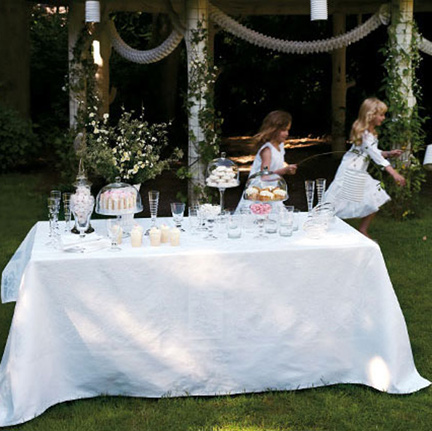
For more great Party Ideas click here!
Guide to Choosing Glassware
Setting the table with the right drinkware is like choosing the right jewelry for an outfit. The glasses will express your personal style, but they’ll also establish the tone and mood of your event.
Glassware Styles
What kinds of glassware are there?
Stemware refers to drinking glasses with a long stem between the bowl and the base. Common pieces include wine glasses and champagne flutes.
Barware includes glasses with solid, flat bases, like highballs and whiskey glasses.
In either case, the shape of each glass is designed to enhance the beverage it holds.
 |
 |
 |
Which glasses should I select for everyday use?
Your everyday glassware should feel comfortable in your hand and be durable, dishwasher-safe, and easy to store. Simon Pearce makes wonderful everyday glasses.
Understanding Glassware Materials
Should I buy glass or lead crystal formal stemware?
It depends on the look you want. Glass is more affordable, but less brilliant. Lead crystal, which is produced by adding 24% red lead oxide to glass, is heavier, more clear, and more brilliant. The addition of the oxide also softens the raw material, so lead crystal can take on more intricate cutwork and designs. High-end stemware is usually made from lead crystal.
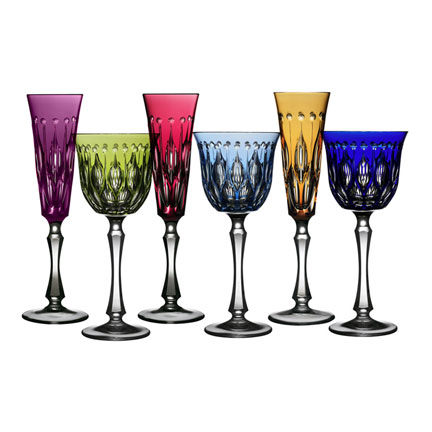
Suggested Quantities
What shapes and quantities should I buy?
At a minimum, we recommend the following:
12 everyday water or juice glasses
12 formal water glasses
12 formal white wine glasses
12 formal red wine glasses
12 champagne flutes
One pitcher
One wine bucket
One wine opener
One ice bucket
What other complimentary pieces do I need?
Other popular options include beer mugs, rocks glasses (like double old fashioned), cocktail glasses (like martini glasses), shot glasses, and brandy snifters. For cocktail parties, additional pitchers, carafes, and decanters are elegant serving items to stock in your bar.
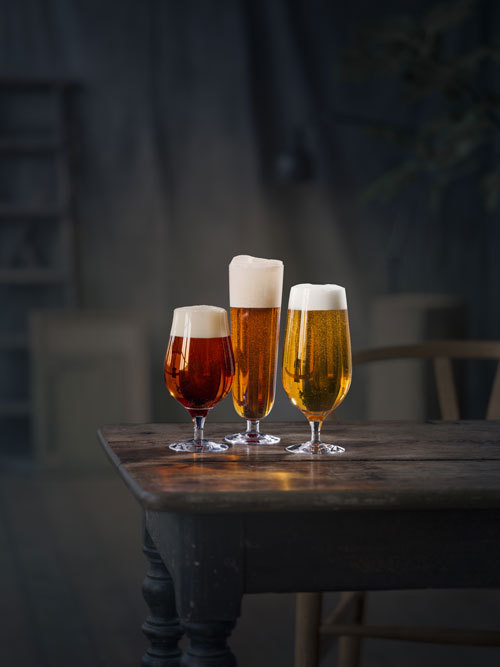 |
Caring for Glassware
How do I care for my stemware?
Fine stemware should be washed by hand and dried with a lint-free cloth. Never use steel wool or abrasives on your stemware. We do not recommend using the dishwasher for any crystal stemware.

How do I store my stemware?
Stemware should be stored right side up to protect the rims of the glasses from breakage. We recommend placing fine stemware near the backs of your shelves to protect them from accidental handling.

Completing Your Set
How do I lay out my dinnerware and stemware?
Place the presentation plate directly in front of each guest’s chair. Next, set the dinner plate directly on top of the presentation plate. The bread & butter plate should be placed at a 10:00 angle to the dinner plate. The water glass should be at the 1:00 angle from the dinner plate and just above the knives. The wine glass is then placed directly the right and below the water glass, and the champagne flute then further to the right and above the wine glass (thus forming a small triangle).

To view more bar and glassware collections, click here.
Guide to Choosing Dinnerware
Selecting a dinnerware collection is an exciting task! With a myriad of options to choose, we at Gracious Style are here to help narrow your search, and find the style that is perfect for you. Whether you are looking for formal china, or fun, everyday essentials, we break down the basics and answer any questions that may arise.
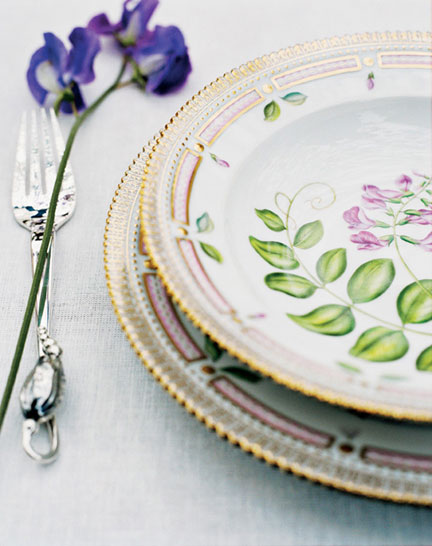 |
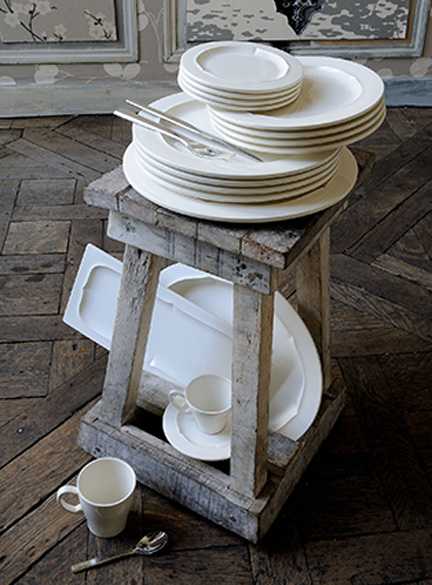 |
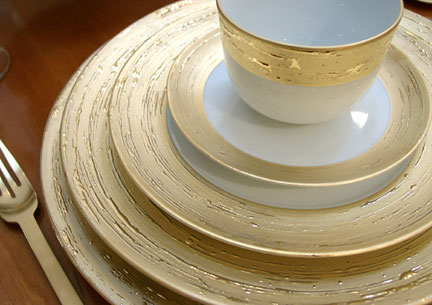 |
Understanding Dinnerware Materials
What are the different types of materials used to make dinnerware?
Luxury dinnerware is usually made of either porcelain or bone china. Casual dinnerware is made from earthenware or stoneware because these are usually more durable, easier to care for, and lower in price.
– Porcelain: The key ingredient, kaolin, is what makes porcelain so extraordinary. Fired at a the highest temperatures, porcelain combines a stark white appearance with incredible durability to make timeless pieces that will last in beauty and reliability for years to come. Well-known names to consider include Raynaud, Haviland, and Philippe Deshoulieres. And if you appreciate hand-painted porcelain, Herend and Anna Weatherley make beautiful pieces.
Care: Most porcelain items are dishwasher and microwave safe. We recommend hand washing for larger pieces, handpainted collections, or items with gold or platinum decoration. Items with metallic decoration should not be microwaved.
– Bone China: This is a very fine, soft-paste clay that is made from several key ingredients, including bone ash. The result is a beautiful, high translucency white with warm, ivory tones. Considered by many to be the finest quality of china, it has great strength and very high chip-resistance. Brands we suggest: Pickard, Royal Crown Derby.
Care: Most bone china items are dishwasher and microwave safe. We recommend hand washing for larger pieces or items with gold or platinum decoration. Items with metallic decoration should not be microwaved.
– Stoneware: Ideal for casual dining, stoneware is fired at very high temperatures to produce pieces which are durable and quite chip-resistant. Available in a numerous range of colors, some pieces also have beautiful crackled surfaces. Brands we suggest: Gien, Jars, Juliska, Vietri.
Care: Dishwasher, microwave, oven, and freezer safe.
– Earthenware: as it is fired at relatively low temperatures, this type of pottery is more porous and less translucent than either porcelain or bone china. These pieces are relatively thick and heavy, and their natural colors range from from buff to red, depending on the clay used. A much-beloved characteristic of earthenware is that it is likely to crackle as the clay expands and contracts, but this does not affect the use of the piece. Brands we suggest: Vietri.
Care: Dishwasher safe; most are microwave safe on low to medium settings. We recommend avoiding sudden temperature changes.
What is Limoges porcelain?
Limoges refers to a region in France where some of the earliest porcelain pieces were produced as far back as 1765. For centuries, the name Limoges has represented the finest quality and craftsmanship in porcelain throughout the world. Limoges porcelain is very white; most of the best-known producers of French porcelain are based in Limoges.
What are some simple ways to determine quality in dinnerware?
You can determine the quality of porcelain and fine china with a few simple tests:
– Hold the piece up to the light and you should be able to see the shadow of your hand behind the porcelain.
– Flick the plate with your fingers and listen for a resonant ring.
– Examine the color and make sure the glaze is even; the finish should be smooth and lustrous.
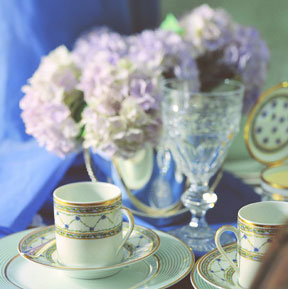 |
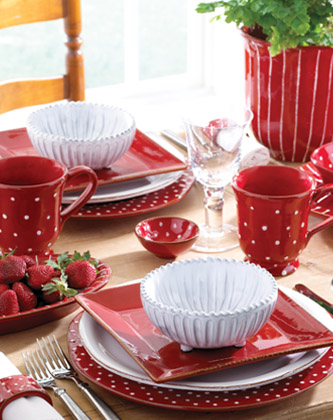 |
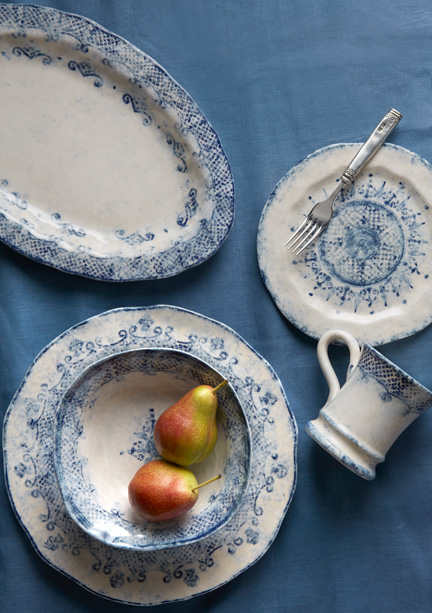 |
Dinnerware Styles
What dinnerware styles are available?
Generally, dinnerware is broken down into casual and formal collections. From there, you can choose between four major styles: solid (meaning one color throughout, with no pattern), banded, patterned, and handpainted.
If you’re looking for something with a monogram or in a specific color, take a look at our custom dinnerware collections.
And for outdoor entertaining, there are also outdoor dinnerware collections available.
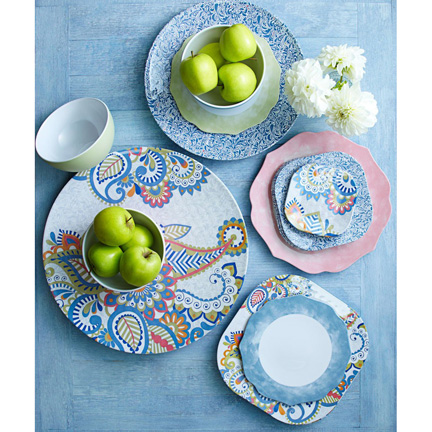
Suggested Quantities
How many dinnerware collections do I need?
In making this decision, we suggest considering the size of your family, the type of entertaining you are most likely to do (formal seated dinners or buffet brunches), and the complexity of your menus. Many people choose to have at least one casual collection for everyday use and one formal collection for selected occasions (usually porcelain).
How many settings do I need?
We recommend registering for twelve five-piece place settings, as these will see you through most dinner parties. These five-piece settings typically include a dinner plate, salad or dessert plate, bread and butter plate, tea cup, and tea saucer. On more casual collections, you will sometimes see four-piece settings available. These normally include a dinner plate, salad plate, bowl, and mug. While you may not always be entertaining for twelve, having additional pieces will guarantee that you have spares when items break or unexpected guests show up. From time to time, collections or specific pieces do get discontinued, so if you love a piece, buy it while you can.
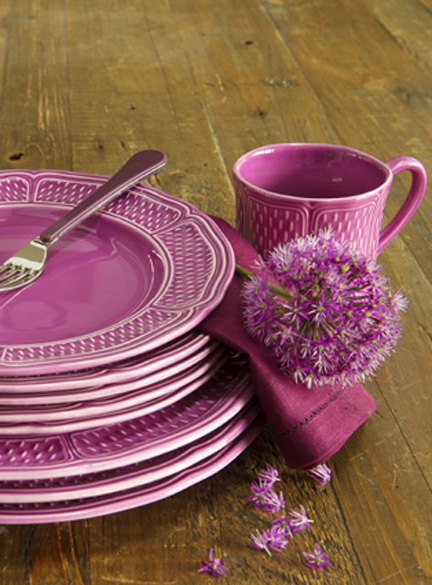
What is included in a five-piece place setting?
A five-piece formal setting consists of a dinner plate, salad plate, bread/butter plate, teacup, and saucer.
What is included in a four-piece place setting?
On more casual collections, you will sometimes see four-piece settings available. These normally include a dinner plate, salad plate, bowl, and mug.
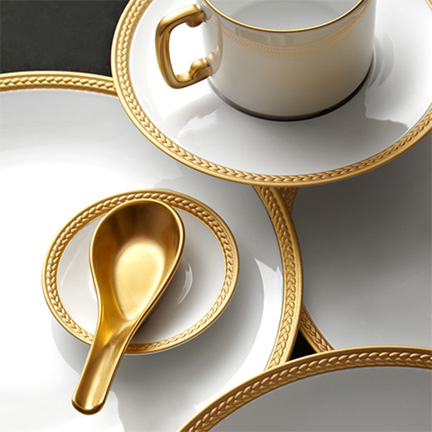 |
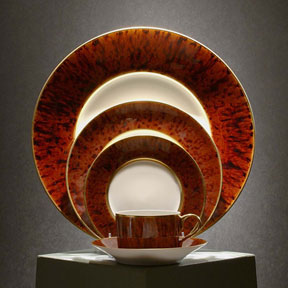 |
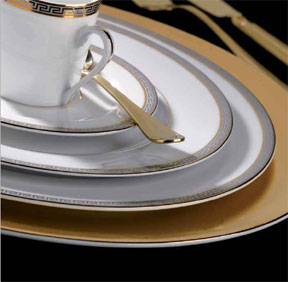 |
What are standard dinnerware sizes?
Sizes sometimes vary slightly among different collections, but they are generally as follows:
| Presentation Plate | 12″ diameter |
| Dinner Plate | 10.5″ diameter |
| Dessert Plate | 8.5″ diameter |
| Salad Plate | 7.5″ diameter |
| Bread/Butter Plate | 6.75″ diameter |
What is a presentation plate?
Also known as chargers or buffet plates, presentation plates are oversized plates (12″ diameter) designed to add color and style to your table setting. These are usually removed before the main course is served, although they are also frequently used as buffet dinner plates since they can hold larger quantities of food.
What kinds of serving pieces do I need?
When registering for dinnerware, it is easy to overlook serving pieces. However, these items are not only great for unifying your collection, they are necessities that will be essential for cooking, entertaining, and everyday dining. We recommend the following as a starting point:
– Two to three serving dishes
– Two serving bowls or salad bowls
– One covered casserole dish
– One cake platter (or better yet, a cake stand for a better presentation)
– One tea and/or coffee service (this should include the teapot or coffee pot, creamer, and sugar bowl)
Caring for Dinnerware
How do I care for my dinnerware?
Most dinnerware items are microwave and dishwasher safe, unless they are decorated with gold or silver. We recommend hand washing for larger pieces, handpainted collections, or items with gold or platinum decoration. Items with metallic decoration should not be microwaved.
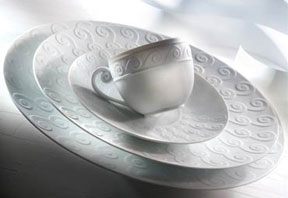 |
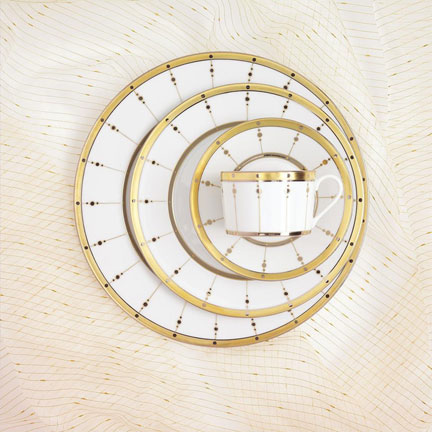 |
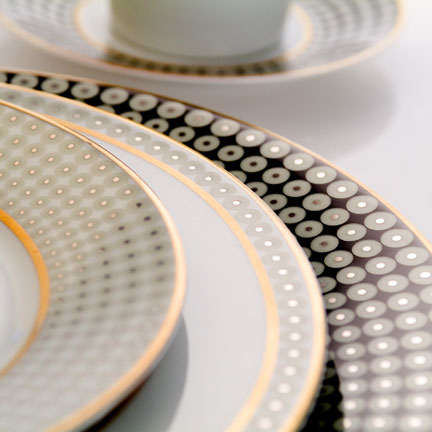 |
Monogramming
How should I monogram my dinnerware?
If you choose to have your dinnerware monogrammed, consider several different options. Single-letter monograms usually feature the first initial of the last name. On three-letter monograms, most individuals choose to have their first, middle, and last or first, last, and middle initials embroidered. For married couples, a popular choice is the initials of the couple’s first names on either side of their married last name.
 |
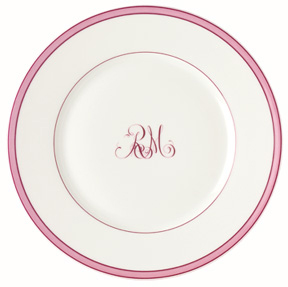 |
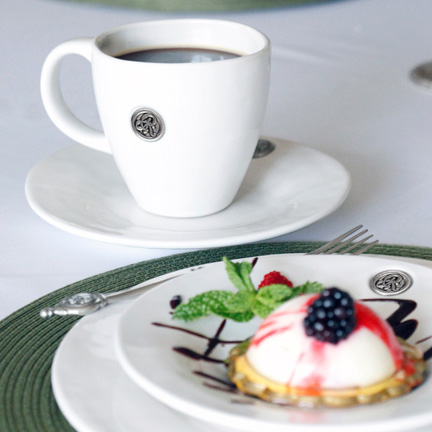 |
Would you like to see more styles? Click here to view all our dinnerware collections.




